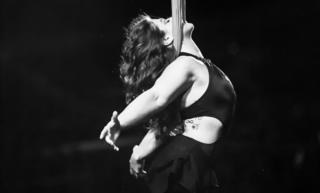 Aerial performer Jennifer Bricker was born without legs, but she never let it stop her. By the age of 11 she was a gymnastics champion — having fallen in love with the sport after watching Dominique Moceanu win a gold medal for the US at the 1996 Olympics. And it turned out the two had a lot more in common than athletic talent.
Aerial performer Jennifer Bricker was born without legs, but she never let it stop her. By the age of 11 she was a gymnastics champion — having fallen in love with the sport after watching Dominique Moceanu win a gold medal for the US at the 1996 Olympics. And it turned out the two had a lot more in common than athletic talent.
Wrapped in a loop of red silk suspended from the ceiling Jennifer Bricker climbs and twists to the music. Her head hangs down and her strong arms let go as she balances on her back, high above the ground — a move that’s all the more daring because she has no legs.
Jennifer was a few months old when she was adopted by Sharon and Gerald Bricker. She had big brown eyes, a radiant smile, and huge amounts of energy. When a doctor advised her adoptive parents to carry her around in a kind of bucket, they refused.
Jennifer soon learned to walk — and run — on her hands and bottom, and grew up fearlessly climbing trees and bouncing on the trampoline with her three older brothers. «They encouraged all of that by having me jump off everything and scare everybody half to death,» she says.
At the age of three she was fitted with prosthetic legs, but she never really took to them — she moved more freely without.
At school Jennifer loved competing in ball games. «I was right there with everyone else,» she says. «My parents didn’t treat me differently so I didn’t grasp the concept that I was different. I knew I didn’t have legs but that wasn’t stopping me from doing the things I wanted to do. »
The Brickers had always been open with her about her adoption. «I knew that I was Romanian and that probably a good reason why I was given up for adoption was because I didn’t have legs,» says Jennifer.
Sharon and Gerald even encouraged her to understand her birth parents — Romanian immigrants to the US who had given her up on the day she was born. «You didn’t walk in their shoes so you really don’t know what was going on in their life. They were from a different country. They had a different mindset,» they would explain.
At the same time, they made sure she felt loved and wanted, telling her she was the answer to their prayers.
Jennifer grew up in a tiny community in Illinois. The first time she saw a fellow Romanian was on TV. It was 1996 and the Olympic Games were taking place in Atlanta. Jennifer loved to watch the women’s gymnastics team, but there was one member of the team she especially idolised — 14-year-old Dominique Moceanu. She was only six years older, and, as Jennifer puts it, «very small» like her.
«I was drawn to her because we looked alike and that was so important to me,» says Jennifer. «No-one looked like me growing up. I didn’t know any other Romanian people. I just saw myself in her in so many ways and that was a big deal for me. »
Moceanu and the women’s team went on to win gold, and it was at that moment Jennifer decided she was going to be a gymnast, too. She took up power tumbling, which involves performing floor exercises down a runway. But Jennifer did not want any allowances to be made for her disability. «That way when I compete, I know that it’s legit,» she says.
She remembers spectators being surprised when they saw her: «Wow, this girl doesn’t have legs — is she competing? »
«But the love, the support when I did compete was amazing,» she says. «They would always applaud and cheer because I made sure that there were no exceptions made for me — nothing. »
At the age of 10 she took part in the Junior Olympics and by age 11 she was tumbling champion for the state of Illinois.
Jennifer continued to follow the ups and downs of her idol, who was now making headlines for different reasons. In 1998, when Dominique was 17, she took her parents to court, accusing them of mis-spending $1m of her post-Olympic earnings. During the court case, stories came out about her father’s harsh treatment of her. She succeeded in legally breaking free from her parents and taking control of her own finances.
When Jennifer was 16 she asked her mother if there was anything they hadn’t told her about her birth family. She really wasn’t expecting her to say, «Yes,» because her parents had always been so open. But to her surprise, her mother did have something important to tell her. She sat her down and said: «Your biological last name would have been Moceanu. »
There was no doubting what that meant. «Immediately when she said that I was like, ‘Wow, that means Dominique’s my sister,'» says Jennifer.
The Brickers had found out purely by accident. Jennifer’s was meant to have been a closed adoption, but her birth parents’ names appeared on some documents. Then, during the 1996 Olympics, the TV cameras had cut to Dominique’s mother Camelia and father Dumitru in the crowd. As their names flashed up on the screen, the Brickers realised they were looking at Jennifer’s parents. But they decided not to tell their daughter until she was older.
When she found out, Jennifer wanted to get in touch with Dominique, but she was determined to do it properly. «I couldn’t just call her and say ‘Hey, I’m your sister’ — I didn’t want her to think I was crazy. » Her uncle happened to be a private investigator so she asked him to contact her biological parents. They didn’t deny putting her up for adoption, but after that first phone call they no longer responded. «It was clear they wanted to continue keeping me a secret,» she says.
Four years later, Jennifer wrote her sister a letter, explaining the situation and telling her how she had inspired her to take up gymnastics.
«I almost could not believe it myself, you had been my idol my whole life, and you turned out to be my sister! » she wrote.
She included copies of all the documentation she had and lots of photographs — all from the waist up. «I instinctively made the choice not to tell her I didn’t have legs because I thought it might be a little bit much,» explains Jennifer. «She’s already finding out she has a sister she didn’t know about. I’ll just wait and tell her about the no legs afterwards. »
By now, Dominique was 26 years old and no longer competing professionally. It was a busy time in her life. She had married a fellow athlete and they were expecting their first child. She was trying to finish her college exams before giving birth. On 10 December 2007, after finishing a statistics exam, Dominique drove to the post office to collect a package.
She tore open the envelope when she got back to the car — the first thing she saw were some court documents with her parents’ signatures. That piqued her interest. Then she shifted her attention to the photographs of a girl who looked just like her younger sister, Christina. «The resemblance was unbelievable,» she says. Finally she turned to the neatly-typed letter. One sentence leapt out at her: «My biological last name is Moceanu. »
«That letter was the biggest shock of my life and I’ll never forget it,» says Dominique.
She needed to know if it was true. Still sitting in her car, she called her mother, who lived a few time zones away, and woke her up with the words: «Did you give up a baby girl for adoption in 1987? »
«She had the wake-up call of her life — it was just so blunt,» she admits.
Her mother burst into tears. She said «Yes» but could barely say anything else.
«My heart broke for her because she had to keep this a secret for all these years and she could never have had the opportunity to deal with it,» says Dominique.
The next few weeks were an emotional rollercoaster. Dominique wrote back to Jennifer, asking for time to process the news and explaining that she was about to have a baby.
«I needed to answer some of my own questions and figure out how this could have happened,» says Dominique.






